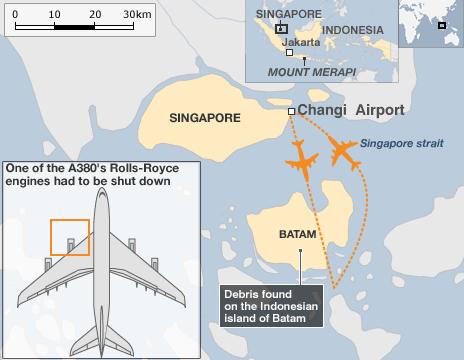Qantas grounds A380s after Singapore emergency landing
- Published
A passenger's mobile phone footage shows the damage to the Qantas plane's wing
The Australian airline Qantas has grounded its six-strong fleet of Airbus A380 airliners after one of the superjumbos made an emergency landing.
Qantas flight QF32 experienced engine trouble shortly after taking off from Singapore on its way to Sydney.
One of the engines exploded with a bang, a passenger told the BBC, and debris was found on an island below.
Singapore Airlines said its A380 flights would be delayed pending technical checks.
Engine maker Rolls-Royce said it was in the process of checking the 20 A380 planes currently in service - with Qantas, Singapore and Lufthansa - that use its Trent 900 engines. It said "the safe operation of our products is our number one priority".
The other 17 A380s in service - with Air France and Emirates - use another engine.
One area of investigation will be a European Aviation Safety Agency (EASA) airworthiness report in August that flagged up one potential problem with the engine. There is no evidence that this is linked to the latest incident.
'Big scare'
Qantas said flight QF32, with 433 passengers and 26 crew on board, experienced an "engine issue" over western Indonesia shortly after taking off from Singapore at about 1000 (0200 GMT).
"It's a significant engine failure," Qantas chief executive Alan Joyce said at a news conference.
"We do take our safety reputation and our safety standards unbelievably seriously. And we're not going to take any risks with passenger safety - and as a precaution, we're suspending the flights of the A380 aircraft until we're comfortable that we understand the reasons for this."
No-one was injured during the incident, which ended at Singapore's Changi airport.
Smoke billowed from the aircraft, which aviation experts say is capable of flying on two engines. One of the engines was blackened and its rear casing was missing.
A team of air crash investigators is being sent to Singapore from France, where Airbus is based, to assist in the investigation.
"I was on the plane right next to engine two, which exploded with a loud bang within the first 10-15 minutes of take-off," Lars Sandberg, a DJ who was travelling to Sydney, told the BBC.
"I thought that something had fallen down in cargo underneath the plane, but the plane started shaking... I'm a little bit shaken up.

"The captain did a good job, though, in reassuring us, making announcements every few minutes."
Passengers said the pilot spent at least an hour and a half circling and discharging fuel ahead of the emergency landing.
"When we got off and saw the engine itself and the back casing burnt off, that was pretty scary," Mr Sandberg said.
The BBC's Nick Bryant in Sydney says aviation experts have identified debris that fell on the Indonesian island of Batam as part of a Qantas engine casing.
A teacher on Batam, Indra Kurniawan, told the BBC World Service: "We heard an explosion. Then I saw rubbish in the sky but after one of the pieces hit our school, we all knew it was debris from the plane."
The grounding will mean inconvenience for thousands of passengers scheduled to fly on the aircraft, correspondents say.
Those aboard the stricken aircraft may also have a significant wait ahead to get to their destinations as there are so many of them to re-route.
Singapore Airlines, which operates 11 A380s with Rolls-Royce engines, says it was advised by Rolls-Royce to carry out "precautionary technical checks" on its aircraft.
"Singapore Airlines will be delaying all flights operating our A380 aircraft," spokesman Nicholas Ionides said.
Rolls-Royce said it was unclear how long its checks would take but that they were "fairly basic". It is anticipated these will be one-off checks.
The EASA confirmed it had issued an airworthiness directive on 4 August requiring an inspection of certain conditions within the Trent 900 engine.
"Some of these conditions present a potential unsafe condition to the aeroplane," it said.
Mobile footage captures the moment the plane lands at Singapore
EASA communications officer Jeremie Teahan told BBC World News that one of its experts was en route to Singapore to take part in the investigation.
Rolls-Royce said it was working with its customers and analysing the data, adding: "This is at a very early stage and it would be inappropriate to draw any conclusions at this time."
Air France and Emirates use the GP7200 engine built by a consortium called Engine Alliance. The airlines say they have no plans to ground their fleets.
Bad timing
This incident is a worrying development for Qantas, an airline which prides itself on an exemplary safety record.
For the European manufacturer Airbus, the timing of this incident could hardly have come at a worse time, reports the BBC's Christian Fraser in Paris, as the Chinese President Hu Jintao is in Paris to complete negotiations for a new order of Airbus A350 and A330 passenger planes.
The closest the airliner has come to a similar incident was in September 2009, when a Singapore Airlines A380 turned around in mid-flight and returned to Paris after one of its four engines failed.
The A380, which made its maiden flight in 2007, is the flagship of the European aviation giant's fleet.
The result of a long and costly research programme, it made its first commercial flight in 2007. It is the world's largest passenger airliner, a double-decker which can carry up to 800 people - though Qantas A380s are set up to carry about 450.
- Published4 November 2010
- Published4 November 2010
- Published8 February 2012
- Published18 October 2010